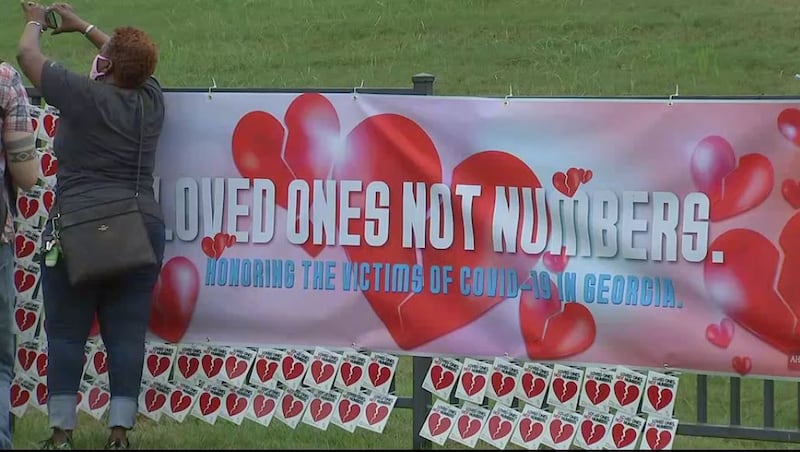ATLANTA — Each person lost to COVID-19 leaves behind a puzzle piece -- a clue-- to help us learn from the disease and save lives.
That puzzle piece is their death certificate.
Channel 2 Action News examined information from nearly 13,000 death certificates of Georgians who died in hospitals this year. It paints a picture of the human toll of the coronavirus and who it’s disproportionally killing in our state.
“My faith has been tested, and I’m asking god ‘Why? Why Mike?’,” Robert Murrell told Channel 2 anchor Jorge Estevez. “Here’s a guy that’s healthy, loving he’s giving. Why Mike?”
Mike Murrell showed love through his food and hospitality to customers at his Murrell’s Café restaurants. He loved with service and friendship through his Omega Psi Phi brothers. That love is what Robert said made losing his big brother to coronavirus so unbearable. On April 28, he went to Emory Decatur Hospital, took Mike off a ventilator and said goodbye.
“That decision, making that decision. What was that like?” Estevez asked.
“When I walked in, and I saw my brother in the condition that he was in, to me with this was a no-brainer,” Robert said. “His quality of life would have been really, really bad.”
Mike spent 34 days in the hospital and 32 on a ventilator to help him breath. He is one of more than 7,000 Georgians lost to the virus. Many of them, like Mike, died in Georgia hospitals.
TRENDING STORIES
- Man explains what happened when he tested the COVID-19 vaccine
- Gov. Brian Kemp, state health officials warn of ‘Twindemic’ of COVID-19 and flu season
- Study: Women almost 3 times more likely than men to quit jobs to care for kids during pandemic
To learn more about the people this disease is killing, Channel 2 Action News made a Georgia open records request to the Department of Public Health for death certificate information for the nearly 13,000 people who died in hospitals this year from April 1 through Aug. 1.
“I think if you look at the overall picture of what these certificates tell us it’s probably a pretty good picture of what the ensemble of deaths from various causes really has been,” explained Dr. Richard Rothenberg with Georgia State University’s School of Public Health.
He explained that underlying conditions, and the events leading up to a person’s death are valuable tools to researchers trying to understand the disease.
“There are obviously lots of slip ups and difficulties with death certificates, but on average. They do a pretty good job of defining the major causes for an individual,” Rothenberg said.
Of the nearly 13,000 deaths Channel 2 examined, COVID-19 is listed as a contributing factor in at least 2,600 of them. That’s about 20%. On a majority of deaths under 65 that listed underlying conditions, obesity, hypertension and diabetes were listed.
“Georgia is one of the worst affected states in terms of obesity,” Dr. Ben Lopman with Emory University’s Rollins School of Public Health said. “[It] might be one of the things that makes us as Georgians, or particular groups for sure, to be more susceptible to these severe outcomes, including death.”
Lopeman said there are things death certificates doesn’t tell us about the virus, like why the US is experiencing a rise in non-COVID deaths during this pandemic and how many people are skipping critical healthcare visits, like cancer treatments, because they’re scared to visit their doctor.
But he said deaths are a clear way epidemiologist to learn from the disease because there were testing challenges confirming COVID in the living.
Lopman did note a disturbing trend -- that Black and brown Americans are disproportionally impacted by COVID.
“I think the racial differences have been surprising, and that highlighted really the large inequalities in, in terms of health in our state and in our country,” Lopman said.
Here in Georgia we leaned COVID is killing more Black people in hospitals. 48% of the people who died were African American or Black, while 46% were white. To put that number into perspective, according to the US Census Bureau about 60% of our state’s population is white, and only about 30% is Black.
Robert said Mike Murrell was 65 years old with no underlying conditions. But Mike is one of the African Americans who deaths outpaced whites in Georgia hospitals this summer.
“When you hear those stats, and that information, what goes through your mind?” Estevez asked Murrell.
“It’s just not fair,” he said.
If there is hope in all of this loss, Lopman explained more people are surviving this disease because our healthcare workers and scientists are learning to treat it. But their knowledge, from thousands of death certificates, come at cost too high to measure.
“We’re learning more, but it’s at the expense of people like your brother,” Estevez said. “Does that give you any solace knowing your brother’s making a difference?”
“Yeah, it does,” Murrell said. “I mean it doesn’t bring him back, but it does hurt that it has taken so many lives, to be lost in order for us to really, really take it serious.”
Cox Media Group







